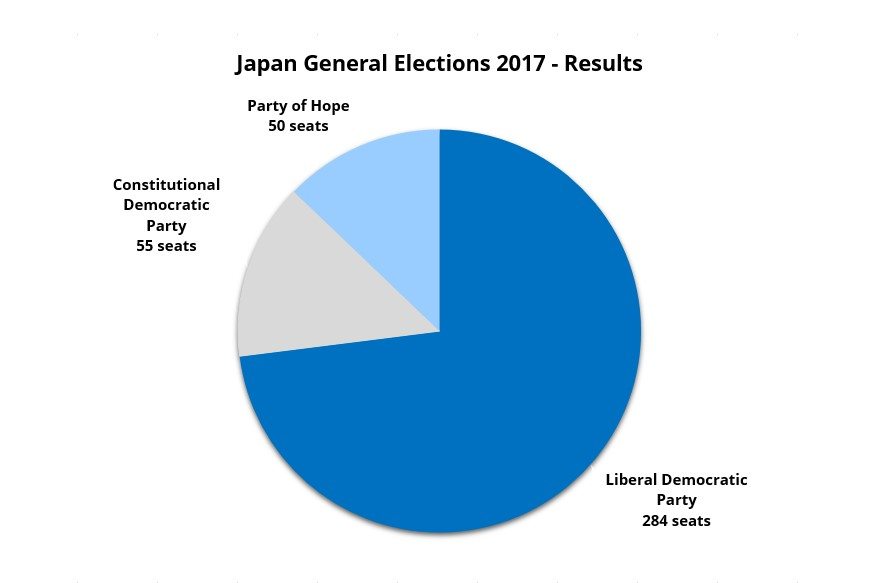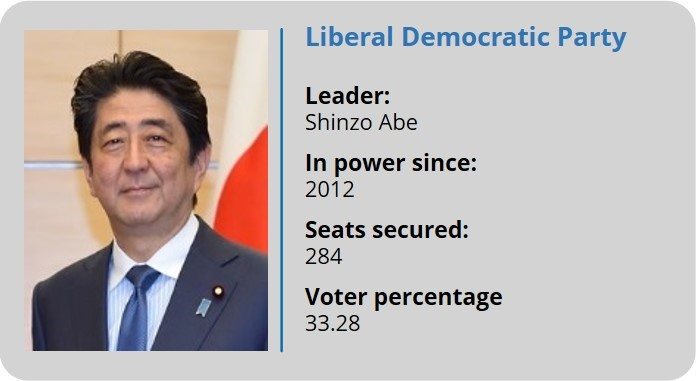Current Situation
Japan held nationwide general elections on October 22 to appoint 465 people to the House of Representatives, the country’s Lower House of parliament. The ruling Liberal Democratic Party (LDP), as well as the newly established Party of Hope (PoH) and Japanese Communist Party (JCP), were all vying for seats. The traditional primary opposition party, the Democratic Party of Japan (DP), decided not to field any candidates after a crushing defeat to LDP in 2012. The Constitutional Democratic Party of Japan (CDPJ) was formed after a split from the DP in October 2017, further weakening the once powerful DP.
The LDP secured 284 seats out of a total of 312 seats obtained by the ruling coalition while the CDPJ came second with a seat share of 55 seats. PoH came in third with 50 seats.
The snap elections were called after PM Abe dissolved the Lower House on September 28, citing the administration’s need for a fresh mandate to deal with contentious subjects like intensified North Korean hostilities and controversies surrounding domestic social welfare policies. PM Abe has also long called for reforms to Japan’s pacifist constitution, a highly emotive proposition in a largely pacifist Japanese society.
The PM’s approval rating had witnessed a notable dip in July 2017 following allegations of his involvement in a number of scandals involving cronyism. However, polls taken in September suggested that the approval ratings bounced back in the immediate aftermath of North Korea’s firing of two ballistic missiles over Japanese airspace during the month. PM Abe is considered to maintain a hawkish stance regarding Pyongyang’s provocations.
PoH leader Yuriko Koike, a former LDP lawmaker and the current governor of Tokyo, announced the formation of her party in September, attempting to contrast the relatively hawkish policies of the ruling government by calling for more tempered policy vis-a-vis North Korea, a freeze in tax hikes, and the establishing of a 2030 deadline to eliminate nuclear power plants. Despite their stated differences, critics claimed that the party was too ideologically similar to the ruling LDP and that it failed to offer feasible policy alternatives.
Assessments & Forecast
Opposition weaknesses, PM Abe’s tough stance towards North Korea likely served as key determinants in LDP’s retention of super-majority in parliament
PM Abe’s decision to call for snap elections was likely influenced by the recent surge in his approval ratings, perceived to largely stem from his tough stance on North Korea. As tensions with Pyongyang reached unprecedented heights in recent months, culminating in the missile launches over Japan on August 29 and September 15, PM Abe’s attempts to foster a more offensive-capable military by revising Japan’s pacifist constitution became increasingly palatable to the general public. The resounding nature of the victory highlighted current priorities of the Japanese general public, which may have placed the PM’s alleged involvement in scandal and feelings of anti-incumbency as secondary when compared to direct security threats from Pyongyang.
Another significant factor in the victory was the perceived lack of a viable alternative, as the newly created PoH was too weak to pose a legitimate electoral challenge to the ruling party. Apart from the party’s inability to significantly distinguish itself from the LDP in terms of policy, another significant factor was Koike’s decision not to participate in the election itself but rather remain as the party head. Voters likely perceived this as an attempt by Koike to hedge her bets, using the election as an opportunity to test the political waters while still maintaining her position as the current governor of Tokyo.
PM Abe unlikely to push for amendment of constitution in the immediate term due to contentious status in society, US pressure
PM Abe will likely use the LDP’s electoral gains as evidence that the society is supportive of revisions to the country’s post-World War II pacifist constitution, which the leader has suggested he aims to amend by 2020. Conversely, as of present, only the CDPJ remains vocally opposed to the constitutional review. The PM will likely highlight the poor electoral performance of the CDPJ as an indication of growing public consensus regarding Japan’s evolving regional security environment.
Before dealing with the constitution, the new government’s immediate priority will likely remain economic recovery and containing the North Korean threat, particularly as the snap election was called by PM Abe as a mandate on the government’s handling of those issues and not the constitutional review. Despite strong support for the LDP and his candidacy, PM Abe continues to maintain low approval ratings. The fact that the election victory was at least partially the result of a lack of credible alternatives to the Japanese public, movement on more contentious issues like the constitution will likely continue to be met with severe backlash. Even LDP’s coalition partner, Komeito, which is open to a constitutional review, has indicated that it will still likely be an “opposition within the coalition” on the matter.
As such, the PM would likely not push for reforms in the immediate term, instead, using geopolitical triggers that the country can rally behind as evidence of the necessity for such changes, such as a dramatic escalation in North Korea tensions or perceived aggressive movements by Beijing in the Spratly Islands. Even though the LDP has a supermajority, since it is such an emotive issue, PM Abe is unlikely to attempt to alter the constitution without some form of a unity government, especially given that many opposition parties have expressed their willingness to hold a review of the 70-year-old constitution. Their motivations for expressing willingness are likely an attempt to have some degree of influence over the deliberations on the changes.
PM Abe’s hardline stance against North Korea in recent months has seemingly paid off in the eyes of the general populace. This suggests that the Japanese PM will attempt to double down on his hawkish stance, further supporting aggressive sanctions against North Korea with strong mechanisms for enforcing them. He is also likely to continue his policy of non-negotiation with Pyongyang. While US President Donald Trump is especially supportive of PM Abe, the US is unlikely to support the constitutional reform, as the move will likely be viewed by both Beijing and Seoul, both of which suffered under Japan’s World War II expansion, as provocative and destabilizing. Further, it may complicate the long-standing military relationship between the two nations.
US relations with Japan likely to see improvement under new administration
FORECAST: The controversial constitutional changes aside, overall, Japan’s relations with the US are likely to improve as a result of Abe’s landslide election victory, given the convergence of strategic interests on several issues including regional security. It is also important to note PM Abe’s seemingly excellent interpersonal relationship with US President Donald Trump. In contrast to the leaders of other traditional US-allied nations like German Chancellor Angela Merkel and French President Emmanuel Macron, who have been critical of the newly-elected US President, Abe’s efforts have thus far focused exclusively on charming Trump. This includes Abe’s visit to Trump’s Mar-a-Lago resort just one week after he was elected, as well as over a dozen phone calls between the two since the President took office. It was reported that President Trump asked a group of congressmen in mid-June why they could not be more like Shinzo Abe. This closeness will likely be especially apparent in the coming week when the US President is expected to visit Japan as part of his November overseas trip.
This relatively unique relationship may compel PM Abe to push for increased defense cooperation with the US, with a particular focus on bolstering Japan’s ballistic missile defense capabilities. It also remains possible he will use the constitutional review as leverage over the US, as having additional close protection services from its ally would minimize the justifications for needing an offensive military force. This would also alleviate recently growing sentiments in Japanese society, which see Washington’s inability to come to Tokyo’s aid and deter Pyongyang’s repeated ballistic missile launches and threatening rhetoric as an indication that the country must defend itself.
PM Abe’s successful reelection will nevertheless be perceived as a favorable result by Washington with respect to the US-Japan alliance. Similarly, regional neighbors concerned by Beijing’s maritime expansionism, like Taiwan, the Philippines, and Vietnam, are also expected to welcome the election results, as PM Abe has visibly strengthened defense relations with these actors during his term in office.

